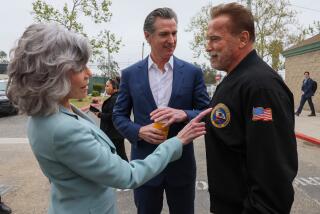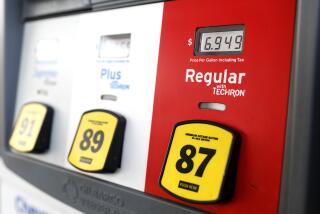Tom Steyer eyes new oil tax and gas-price transparency

San Francisco billionaire Tom Steyer spoke in September 2013 in Richmond, Va.
Wealthy Bay Area environmentalist Tom Steyer, who for weeks has been lambasting oil companies about gasoline prices, said Friday he was exploring another potential cudgel against the industry: ballot measures to tax oil extraction and require more public disclosure on pricing and supply.
Laying the groundwork for a possible ballot battle next year, Steyer said he was attending this weekend’s state Democratic convention in Anaheim to “talk to a bunch of people and see where they put this in their priorities.”
Ballot measures would require a “broad coalition” of support to be viable, he said.
Steyer, a former hedge fund manager, declined to say whether he might spend the millions of dollars it would take to get such proposals on the ballot and run a campaign to win voter approval.
California voters and legislators have a history of rejecting bids to tax oil extraction.
Steyer’s record of spending heavily on political campaigns has made him a nemesis of the oil and gas industry. Last year, Steyer gave $74 million to candidates who pledged to fight global warming.
He has also flirted with running for political office himself. He recently weighed, and rejected, making a bid to succeed retiring Sen. Barbara Boxer (D-Calif.). Many political observers consider him a potential gubernatorial contender in 2018.
Meanwhile, he is an increasingly visible force in state politics: testifying in the Legislature, contributing to political campaigns and funding his own advocacy organization, NextGen Climate, which aims to fight climate change “and promote prosperity for all Americans” through political activity.
He recently called on the state Senate to subpoena industry executives to explain why prices surged in California this spring.
In Anaheim on Friday, Steyer and Jamie Court, president of the advocacy group Consumer Watchdog, released a memo on public opinion about two potential ballot measures.
One measure would impose a 10% oil extraction tax and dedicate the revenue “to making higher education affordable for California residents.” The other would strengthen “disclosure requirements for oil companies’ management of gasoline supplies and prices.”
Steyer and Court lamented refinery shutdowns, sometimes for maintenance, that oil companies have cited as a reason for price increases. The pair said there was too little public information about decision-making on the closures.
Some advocates of steps to address climate change have suggested that higher gasoline prices would be a good thing, an incentive to get motorists off the road. Steyer, however, called for lower fuel prices.
“I want to understand why Californians are paying up to $1 billion more to oil companies per month for gasoline prices than anywhere else in the country,” he said.
“To me, that’s a question about fairness to working people who have to use their cars to get to work, who don’t have a choice.”
Sabrina Lockhart, a spokeswoman for Californians for Energy Independence, an advocacy group for oil and gas companies, said, “It’s ironic that a billionaire who is promoting policies that will cause energy prices to rise suddenly cares about what Californians pay at the pump.”
An oil extraction tax has been on the ballot before. A 2006 initiative would have imposed a sliding scale tax on oil pumped from the ground to fund a $4-billion alternative energy program.
Proponents spent more than $60 million on the measure, with nearly $50 million coming from a single backer, Hollywood producer Steve Bing. The oil industry countered by spending $90 million and warning that any tax increase would lead to higher prices at the pump. The initiative was defeated.
At least half a dozen oil severance tax measures have been introduced in the Legislature since 2008; all failed to reach the governor’s desk.
Gov. Jerry Brown has been cool to the idea in the past. Asked last year about a possible levy on oil extraction, he said it was not the time for new taxes.
And while Brown’s ambitious goals to combat climate change rankle oil companies — particularly his desire to cut motorists’ gasoline use in half within 15 years — his relationship with the industry has not been purely adversarial.
He has heralded the economic possibilities of hydraulic fracturing, or fracking, an extraction technique that critics have decried for its environmental ramifications. He signed a 2013 bill that would regulate, but not halt, the practice.
Twitter: @finneganLAT
More to Read
Start your day right
Sign up for Essential California for news, features and recommendations from the L.A. Times and beyond in your inbox six days a week.
You may occasionally receive promotional content from the Los Angeles Times.






